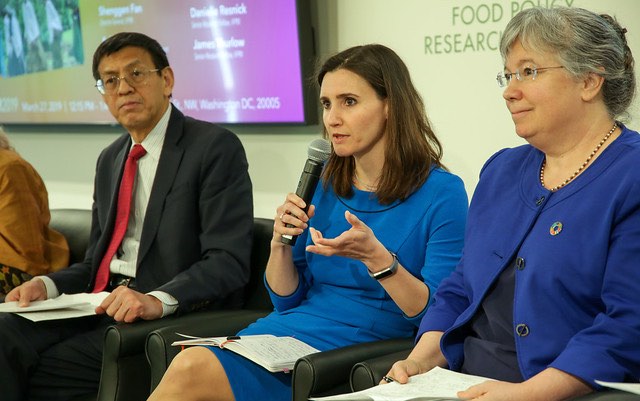As the world faced a difficult 2018—with ongoing conflicts, climate-driven disasters, and political stresses—rural areas confronted persistent and deepening hunger and malnutrition. As urbanization expands, rural areas risk being further left behind, which is why IFPRI’s 2019 Global Food Policy Report (GFPR), launched March 27, focuses on the urgent issue of rural revitalization. The report, which also outlines major policy developments in 2018, explores ways to confront rural challenges from electrification to gender equity.
At the GFPR global launch event at IFPRI headquarters, chapter authors shared highlights from the report that they hope will collectively focus action on rural areas—helping to end hunger and malnutrition, achieve the UN 2030 development agenda, and improve rural lives.
“The 2019 Global Food Policy Report zooms in on how we’re going to revitalize rural areas,” said IFPRI Director General Shenggen Fan. Progress toward reaching the Sustainable Development Goals (SDGs) by 2030 is not on track, he said, and much of that is due to neglect of rural areas, where 50-60% of the world’s impoverished population lives. With malnutrition rates two to three times higher than those of urban areas, Fan explained, rural areas also often lack access to clean drinking water and sanitation. As rural youth have departed to seek employment in cities, environmental deterioration exacerbates their unwillingness to return to their villages. Integrating rural and urban development together—rurbanomics—holds the key to revitalizing rural areas, he said, and must include improved infrastructure, broadband internet connectivity, and access to electricity, among other things, to help create both farm and non-farm jobs.
“We have just over one decade to transform the day-to-day reality of billions of food and nutrition-insecure people by protecting the environment and natural resources upon which our planet depends,” said lead chapter co-author Achim Steiner, administrator of United Nations Development Programme (UNDP), in a video message. The GFPR, he noted, calls for a wholesale transformation of global food and agriculture systems, and investing in rural communities and in rural-urban connections will accelerate progress on all of the SDGs.
Almost 1 billion people lack access to electricity globally, but solar technology offers a promising solution and is a key element of rural revitalization, said chapter seven author Channing Arndt, director of IFPRI’s Environment and Production Technology Division. Solar panels have become steadily more affordable in recent years, he noted, and many of those lacking access to electrical grids live in very sunny areas. “Universal energy access isn’t going to happen by itself,” Arndt said, “we need to deliver packages of support.” In other words, to leverage the opportunity of cheap solar energy, the electricity it generates should be used to improve the efficiency of tasks like water collection and grinding grain—while also being mindful of potential unintended environmental consequences.
Environmental degradation is another significant problem for rural areas. IFPRI Senior Research Fellow Ruth Meinzen-Dick explained that poverty is a major contributor to rural environmental problems. Agricultural economies often harm local environments, she said, while at the same time rural residents are often the most knowledgeable about their own surroundings. To foster better care of these rural environments, she said, it’s imperative to ensure rural people have property rights, so they have a personal stake in a cleaner environment, and to provide incentives to make investments in ecosystem services, precision farming, small-scale irrigation, and communications technologies that can increase yields and reduce environmental degradation.
Jamison Ervin, manager of UNDP’s Global Nature for Development Program, invited the audience to imagine they were a rural female Rwandan farmer named Ivy and explained how she lacked the necessities for effective farming, including electricity and other energy sources required to plow, plant, water, harvest, process, store, and transport her crops. The resulting inefficiencies result in about 30 percent of on-farm food losses. Rural farmers are essential to the global food supply, she said, noting that millions of families and smallholders around the world provide 80 percent of the food consumed in Asia and Africa south of the Sahara. “We must catalyze private sector finance for clean energy, and radically increase access to credit and micro loans,” she said. “We need to transform our own imaginations–this groundbreaking report invites us to do just that.”
“Women and girls don’t live in a vacuum … they are embedded in households and communities,” said IFPRI Senior Research Coordinator Hazel Malapit. If our collective vision is a future where everyone participates in and benefits from transforming rural areas, she said, then eliminating the barriers that constrain women and girls is critical. Revitalization efforts can employ a “reach, benefit, empower” framework to ensure that women receive all the benefits of rural development efforts than men do; and include opportunities for them to obtain access and rights to land, technology, and other resources.
“Agriculture is a long way away, in Africa, from being unimportant,” said IFPRI Senior Research Fellow James Thurlow. Most rural African households still earn most of their income from agriculture, he said, and as many as one third or one half of these households live within one hour of a city of 50,000 people or more, per FAO data. Efforts to revitalize rural areas, Thurlow said, must strengthen rural-urban linkages by broadening traditional partners beyond ministries of agriculture; investing in modernizing and diversifying agriculture; and investing in basic services and human capital.
IFPRI Senior Research Fellow Danielle Resnick emphasized that all the recommendations discussed imply a broader role for the public sector in rural revitalization. This means, for example, stronger regulatory and legal regimes to minimize environmental and foodborne hazards. Greater government accountability to citizens, Resnick concluded, is also a necessary prerequisite for rural development, in that it ensures that citizen priorities are reflected in policies and spending.
Katarlah Taylor is an IFPRI Senior Events Specialist.







